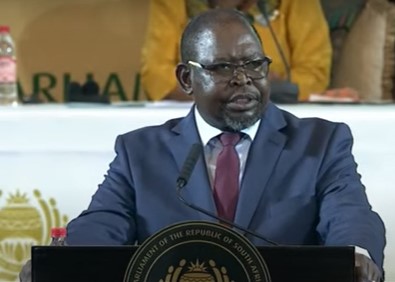Finance Minister Enoch Godongwana delivered his 2024 Budget at City Hall yesterday, which experts say lays bare the ongoing fiscal challenges as revenue collection falls short of expectations, while public sector wage demands and rising debt service costs worsen expenditure.
Compared to the 2023 Budget review, gross tax revenue is lower by R56.1 billion in 2023/24, with shortfalls of R44.7 billion and R52.2 billion in 2024/25 and 2025/26, respectively, driven by underperformance in corporate income tax and value-added tax collections.
To address fiscal pressures and support debt stabilisation, the 2024 Budget proposes net tax revenue increases of R15 billion in 2024/25, primarily through non-inflationary adjustments to personal income tax brackets, rebates, and medical credits.
This means workers could pay more tax due to “bracket creep”. So if you receive an inflation-related raise this year, you may be pushed into a new tax bracket and pay relatively more tax.
Tax revenue in numbers:
- A R16.3 billion revenue increase in 2024/25 through non-inflationary adjustments to personal tax brackets and rebates, which extends starting point effects of R17.3 billion in 2025/26 and R18.6 billion in 2026/27.
- Non-inflationary adjustments to medical tax credits which raises revenue by R1.9 billion in 2024/25, R1.9 billion in 2025/26, and R2.1 billion in 2026/27.
- The introduction of the global minimum corporate tax which will add around R8 billion to revenue in 2026/27.
- Some additional revenue increases from above-increases in excise duties on alcohol.
Tax support measures:
- No adjustment to the general fuel levy which provides a relief of around R4 billion.
- A R0.5 billion electric vehicle incentive in 2026/27, enabling domestic producers of electric vehicles to claim 150% of qualifying investment spending to support the transition to new energy vehicles.
- Government is also prioritising R964 million over the medium term to support the transition to electric vehicles.
What are some of the key aways for consumers?
- No inflationary changes to income tax brackets, so South Africans will still be paying the same amount of tax.
- Sin taxes have moved up with above inflation increases. (See breakdown below)
- No increase in fuel levy, but small increases in carbon tax on fuel.
- Two pot system coming in on September 1st. In simple terms, a person will be able to access a 1/3 portion of their pension but the main aim is to support South Africans during the tough economic climate.
Sin taxes – how much more will you pay for alcohol and cigarettes?
- A can of beer increases by 14 cents;
- A can of a cider and alcoholic fruit beverage goes up by 14 cents;
- A bottle of wine will cost an extra 28 cents;
- A bottle of fortified wine will cost an extra 47 cents;
- A bottle of sparkling wine will cost an extra 89 cents;
- A bottle of spirits, including whisky, gin or vodka, increases by R5.53.
- A R9.51 increase for cigars;
- A 97 cent increase to a pack of cigarettes; and
- An extra 57 cents for a pipe of tobacco.
- Vapes have increased from R2.90/ml to R3.04/ml
Social grants to increase in 2024
- An increase of R100 to the old age, war veterans, disability and care dependency grants.
- This amount will be divided into R90 effective from April, and R10 effective October;
- A R50 increase to the foster care grant; and
- A R20 increase to the child support grant.
- In the expanded Budget 2024 review, National Treasury explained that social grant expenditure – excluding the SRD grant – will increase from R217.1 billion in 2023/24 to R259.3 billion in 2026/27.
The COVID‐19 Social Relief of Distress (SRD) Grant is allocated R33.6 billion in 2024/25 with provisional allocations for the 2025/26 and 2026/27.
National Treasury expects that grant beneficiaries, excluding those receiving the COVID‐19 SRD Grant, are projected to increase from 18.8 million in 2023/24 to 19.7 million in 2026/27.
Overall, main budget expenditure is higher by R9.6 billion in 2023/24 due to increased debt service costs but is expected to decline over the next two fiscal years as non-interest expenditure is reduced by R21.3 billion and R28.5 billion, respectively.
While debt service costs continue to be significant, they decrease compared to the projections outlined in the 2023 Medium-Term Budget Policy Statement (MTBPS), primarily due to the planned R150 billion transfers from the Gold and Foreign Exchange Contingency Reserve Account (GFECRA), which aid in reducing borrowing requirements.
As a result, gross government debt is anticipated to reach its peak at 75.3% of GDP in 2025/26. This projection is 2.4 percentage points lower than the 77.7% projected in the MTBPS but still higher than the 73.6% peak that was projected at the 2023 Budget.
In summary, the 2024 Budget upholds fiscal consolidation efforts, seeking to stabilise debt by bolstering the primary balance surplus and curbing debt service costs. It also prioritises driving economic reforms aimed at enhancing potential growth, broadening the revenue base, and ensuring sustainable public finances.
(Information supplied by FNB, SANews.gov)
Missed Budget 2024? Watch it below:



